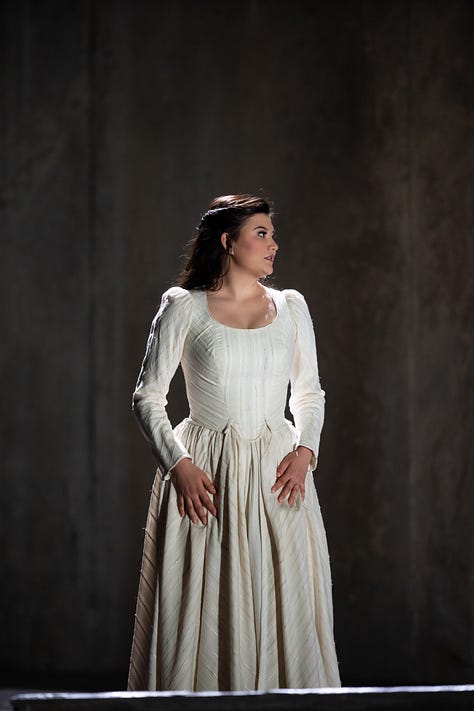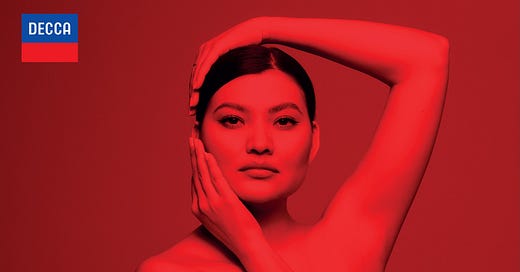AIGUL: Arias from Bizet: Carmen, Rossini: Il barbiere di Siviglia, La Cenerentola, Bellini: I Capuleti e i Montecchi, Massenet: Werther, Trad. Bashkir: The Nightingale (album cover © Decca/Paola Kudacki)
Aigul Akhmetshina (mezzo-soprano) Royal Philharmonic, conducted by Daniele Rustioni with Apollo Voices (chorus master Genevieve Ellis), Freddie de Tommaso (tenor), Elisabeth Boudreault (soprano), Kezia Bienek (mezzo)
Decca 487 0262
This is a fabulous ‘new’ voice. Aigul Akhmetshina - not yet 30 - has been the Royal Opera’s worst kept secret since she joined its Jette Parker Young Artists programme in 2017. Already in those early days the young Bashkir mezzo signalled her entrée as Bizet’s gypsy anti-heroine with an appearance in the title role of Peter Brook’s abridged version of Carmenat Wilton’s Music Hall. Her solo debut album arrives in the middle of a Carmen binge for the young artist. She is about to appear in the second series of Glyndebourne’s new production, having recently headlined new stagings at both New York’s Met and Covent Garden, as well as revivals in Munich and Berlin. Aigul - as her record company bills her (pronounced Eye-ghoul) - already has a passe-partout in French opera’s most celebrated role.
This disc doesn’t merely cash in on Akhmetshina’s ubiquity as Bizet’s bohémienne. It is an ideal calling-card, focussing as it does on three very different roles that she has already conquered at Covent Garden - Carmen, Charlotte in Massenet’s Werther, Rosina in Rossini’s Il barbiere di Siviglia. Decca has really pushed the boat out for her, engaging the conductor of her Metropolitan and Bavarian State Opera Carmens, Daniele Rustioni, at the head of the Royal Philharmonic Orchestra, with a chorus for Carmen’s Habañera and Cenerentola’s spectacular final rondò pyrotechnics. Decca’s recently signed Anglo-Italian tenor, Freddie de Tommaso, makes a brief contribution to Carmen’s Séguedille, while Aigul’s Glyndebourne Frasquita, Elisabeth Boudrault, and Mercédès, Kezia Bienek, are vividly conspiratorial smugglers in the Card Scene.
Her programme of operatic scenes - and a beautiful folk song from her Bashkir homeland, The Nightingale, orchestrated by Kamil Yusufovich Rahkhimov, somewhat in the style of Canteloube’s Chants d’Auvergne (with a Middle-Eastern accent) - exploits all the colours and technical prowess of a young singer, who more than any other Jette Parker artist I have heard, sounded the finished product from her earliest appearances.
Her Carmen has at least three voices, teasingly witty in the Habañera, more overtly seductive in the Séguedille, with darker accents to the fore as she reads her fate in the cards. It helps to have a born opera conductor of Rustioni’s quality: like Akhmetshina he captures the sunny, smiling qualities of the first two songs, but unleashes drama aplenty in the Card Scene.
Akhmetshina’s Charlotte presents an entirely different physiognomy in the two extracts from Werther, her voice as velvety and consoling as it was at Covent Garden last season: it was striking how the mezzo soprano portrayed this passionate young woman as an un-Carmen-like seductress.
As for the Italian items, Rustioni encourages his star singer to deliver the ‘endless melody’ of Bellini’s cantilena in Romeo’s two numbers from I Capuelti e I Montecchi - might we hope for a Covent Garden revival of the handsome Pierluigi Pizzi staging that showcased the Romeos of Baltsa, Troyanos, von Otter, Garanča? - while the Rossini arias, Rosina’s ‘Una voce poco fa’ from Barbiere and especially the coloratura fireworks of La Cenerentola, reveal a voice of remarkable agility, a well as a sparkling comic persona with a twinkle in her eye. The opera world is Aigul’s oyster.



Aigul Akhmetschina at Covent Garden: left to right: Carmen Picture © Rosina Picture © Charlotte Picture © Bill Cooper





I have listened through several times to this recital and thoroughly enjoyed it, a new star basically, I want to hear more.
I don't normally go for 'bleeding chunks' albums, but I may need to make an exception in this case!